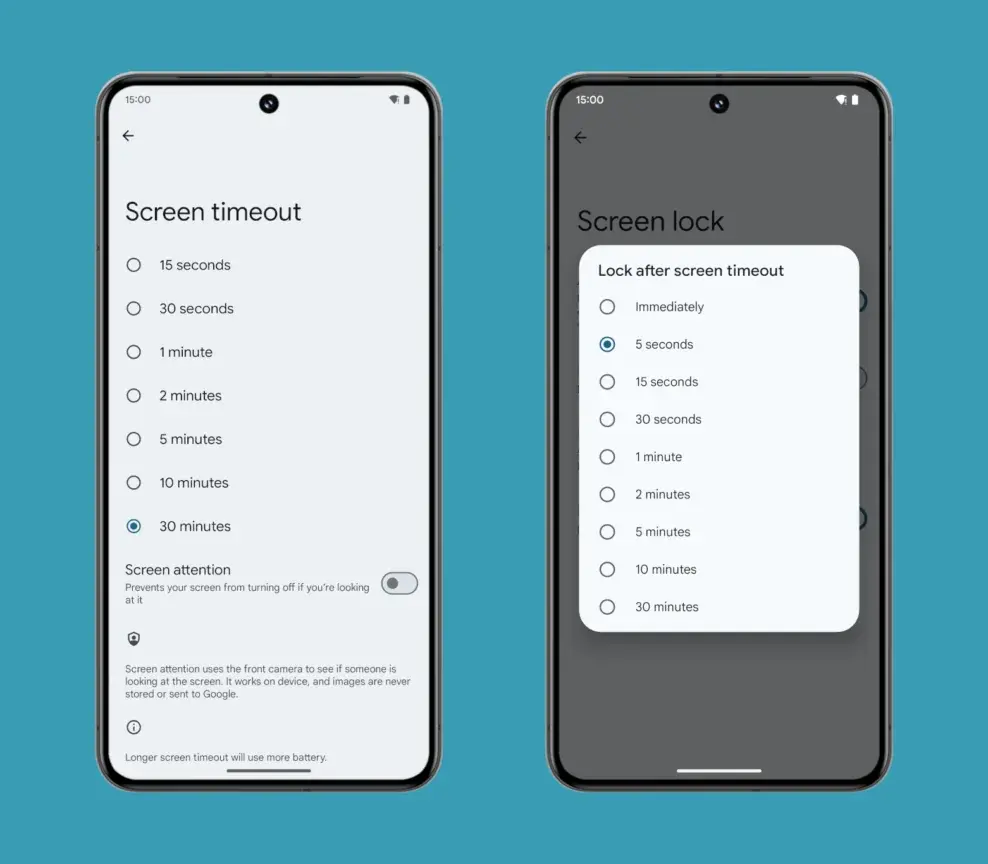The world of Android is constantly evolving, with Google diligently refining its mobile operating system. While Pixel users continue to receive quarterly updates for Android 14, the stage is being set for the highly anticipated launch of Android 15 later this year. While the official release is still months away, developer preview versions have shed light on some of the exciting new features in store, including a revamped volume control, app archiving capabilities, and a unique Easter egg. Now, a recently discovered feature promises to significantly improve battery efficiency: the adaptive screen timeout.
Android 15 Unveils Adaptive Screen Timeout for Enhanced Battery Life

Prioritizing Battery Life: A Focus on the Screen
Smartphone screens are notorious battery drainers. Android 15 aims to tackle this challenge with a novel approach: an intelligent and fully adaptive wait time for screen shut-off. This functionality dynamically adjusts the timeframe before the screen automatically turns off based on your usage patterns. This translates to a more efficient system that conserves battery life without compromising user experience.
Beyond Privacy: A Multi-Pronged Approach
Android 15 goes beyond enhancing battery life, also prioritizing user privacy. As previously reported, glimpses of satellite connectivity integration within the Google Messages app have emerged, mirroring Apple’s use of satellite communication for emergency situations on iPhones. This feature underscores Google’s commitment to providing users with robust communication options, particularly in areas with limited cellular coverage.
Unveiling the Adaptive Timeout Feature
Technical publications have unearthed an intriguing feature within the second Android 15 Developer Preview specifically targeted at improving battery optimization. This feature, known as “adaptive timeout,” dynamically adjusts the screen timeout duration based on user interaction. Currently, users can manually set the screen timeout to a specific timeframe ranging from seconds to minutes. However, this static approach lacks the ability to adapt to real-time usage scenarios.
Adaptive Intelligence: Optimizing Screen On-Time
The existing “screen attention” function on many Android phones utilizes the front camera to determine if the user is actively looking at the screen, thereby keeping it illuminated. However, this functionality has limitations. It cannot proactively shorten the screen timeout when the user is not actively engaged with the device. This is precisely where the innovative adaptive timeout in Android 15 steps in.
While details remain scarce, the feature description suggests that the system will “automatically turn off the screen early if you are not using the device.” The specific criteria used to determine user inactivity remain under wraps. It’s likely that a combination of the front camera and other sensors will be in use to make these determinations.
A Google Pixel Exclusive (for Now)
There’s a caveat to this exciting development: the adaptive timeout feature appears to be exclusive to Google Pixel devices, at least initially. Code strings within the developer preview reference “com.google” classes, indicating that this functionality is currently tailored for Google’s own hardware. As of now, it’s unclear whether this feature will be integrated into the broader Android Open Source Project (AOSP) for adoption by other manufacturers.
The Road Ahead: Continuous Development and User Input
With several developer previews still slated for release before the official launch, further details and potential refinements to the adaptive timeout feature can be expected. User feedback plays a crucial role in shaping the final iteration of Android 15. As more testers provide their input, Google engineers can further optimize this feature to deliver a seamless user experience while maximizing battery efficiency.
The arrival of Android 15 promises a series of advancements, with the adaptive screen timeout being a noteworthy addition. This innovative feature has the potential to significantly enhance battery life, a key concern for most smartphone users. As development progresses, we can anticipate further details on this exciting functionality and other upcoming features in Android 15.





